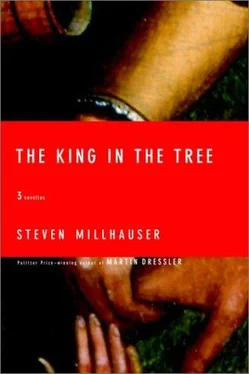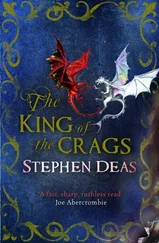Sometimes in the evenings he joined Hood in the library, where he bent over the microscope on the table by the fireplace and examined the little creatures teeming in a drop of vinegar or pond water or an infusion of peppercorns. Nature was so prodigious, Hood declared, that it produced universes in both directions, the minuscule and the gigantic, a vast concord of animalcula and suns; and as Juan tried to share Hood’s awe at the plenitude of Nature, he felt only a discontent, a vague revulsion, as if the universe stretching away in both directions existed solely to reveal to him the fecundity of its indifference.
One morning when Juan came down to breakfast he found Georgiana standing in the drawing room with a letter in her hand, while Mary sat watching her.
“Well, Sir,” Georgiana said in English, glancing up at him, “you shall soon be well rid of me.”
“Madam,” Juan replied, choosing his words carefully, “I would sooner be rid of my honor.”
“Oh,” Georgiana replied, with her eyes on the letter, “that is no very great thing to be rid of.”
Juan, biting down in anger, was uncertain whether she meant to taunt him into a witty reply, or whether she intended a more malicious meaning; and once again he was aware of the odd, physical sense of imbalance he always felt in the presence of this woman, as if he were walking across an unsteady log thrown across a rushing stream.
“Georgiana has had a letter from Father,” Mary said. In a letter filled with news of a quarrel among servants, farm rents, land improvement, a lame horse, and a pious memory of his late wife, he let it be known that he sorely missed his dear Georgiana. She would be leaving Swan Park for Sussex the next morning. Juan looked at Georgiana standing there with her haughty head bent over her letter, her hair in back turned up in a flat plait bound tightly in place. The sheer sight of her irritated every nerve in his body. She had received a letter from her father, the sort of letter that thousands of daughters received every day, and because of it the entire world must be turned upside down. A pleasing routine had been established at Swan Park, a daily harmony, and merely because of this prattling epistle from a fretful father it must now be interrupted, broken up, destroyed forever. Georgiana had no feeling for such things; there was a thoughtlessness about her, even a selfishness, that fit in perfectly with her distant manner and her mocking tone. And whatever she might think of him, a foreign guest toward whom the rules of hospitality required at most a modicum of civility, what of Mary, who without her sister would be left alone for long stretches of the day? — to say nothing of poor Augustus, who liked nothing better than to engage Georgiana in lively discussion at dinner and to walk with her along the river. And although the sight of her standing there with her insufferable letter irritated him so deeply that the mere thought of her absence filled him with delight, it was also true that the pleasure he took in her future absence was diminished by his exasperation at the knowledge of her imminent departure.
That evening Augustus Hood did not return to the library but joined the company in a walk along the Ymber. He and Georgiana strolled ahead of Juan and Mary. The precise reflections of branches in the dark water, the meadow across the river, the sound of cattle lowing, Hood’s riding boots squeaking softly on the path, Georgiana’s hat brim trembling slightly as she walked — all this sank into Juan as if he were seeing it for the last time. “Oh, look!” said Georgiana, pointing to the swan and its five cygnets. She stepped off the path, bending her head, pushing away osier branches for a closer look. Her hat struck a branch and fell to the grass. Juan sprang forward. “Sir,” Georgiana said, laughing, “you startled me.” Juan, wondering irritably whether he was supposed to apologize, handed her the hat in silence, and as she raised it with both hands to her hair, lifting her elbows like wings, he saw her looking away across the water with a cool smile.
And when he came down to breakfast the next morning she was gone, just like that: a conjuror’s trick. Mary would be the next to vanish, and then Hood, and then Swan Park— and the Great Magician, with a fiendish laugh, would open his hand — nothing! — while the blue silk handkerchief fluttered to the floor. Meanwhile, it was as if nothing had changed. Mary sat with him in the breakfast room. He was still sitting at table, staring at the shortened shadow of a cup on sunlit white linen, when Hood arrived in his riding boots and spurs. In the afternoon Juan rode off with Hood to the site of Avernus and then continued alone into the countryside, where he tried to ride himself into exhaustion. At dinner the conversation turned to methods of education. Juan told stories of tutors and governesses in the house in Seville, the lessons in fencing and riding, in mathematics and Latin — oh yes, he had made his way through all twelve books of the Aeneid at the age of thirteen — and as he spoke he kept expecting Georgiana to leap into the conversation in some irritating exasperating way.
Two nights later he woke and saw through his partly open bed curtains a brilliant glow of moonlight in the room. He had fallen asleep fully clothed, with his sword belt still in place. Through the open casement window he saw the deep-blue night sky. He had been restless and distracted; a walk would do him good. At the casement he sprang lightly onto the sill, then lowered himself from the window by climbing partway down along two stone projections on the wall. He dropped to the grass and, keeping away from the kennels, made his way around the guest wing and down to the river. For a while he walked on the path beside the osiers, before stepping into the trees. He sat down against a trunk. Frogs croaked along the riverbank; a bird called sharply and was still. Through the hanging branches he looked out at the dark river shining with moonlight.
He was restless and irritable and melancholy — he could feel disappointment seeping into his skin. His northern journey had been a failure. He had hoped for something — something that was no longer clear to him — and he hadn’t found it here. It was true that he had been happy at Swan Park — happy riding out with Augustus Hood, happy half-seducing Mary and sparing her the descent into triteness, happy even in the exasperating company of irritating Georgiana. But now there was a flatness to things, a dullness in his spirit. He had never been so long without a woman. He was probably doing himself great harm by not ravishing Mary Hood, or her maid-servant, or one of the chambermaids he saw now and then about the house. But he had wanted — he had wanted — and Don Juan, who was a man of action, unused to thinking, tried to seize it, under the tree by the river — he had wanted something else, something more, an adventure so extraordinary that all of Venice by comparison would melt away. He had been a fool. It was time for him to leave Swan Park, to return to his real life — the life of Don Juan Tenorio, conquistador. And at the thought of leaving Swan Park, of never returning to the northern Eden where it was always summer, where women looked at you from under the shade of ribboned hats or stared across rivers with cool little smiles, he felt such a burst of protest, such an inner riot of grief, that he was shaken and almost frightened — he who had faced death a score of times with a mocking laugh.
So Don Juan sat under the osier all that night and tried to seize himself, but he kept slipping away.
When he woke in his bed the next morning, his bones ached and his eyes felt heavy-lidded. At breakfast a terrible weariness possessed him; he could barely keep his head erect. Far, far away he saw Mary looking at him through quivering air, she seemed to be saying something, and when he tried to stand up he heard a great roar, as of a nearby cascade.
Читать дальше












